|
|
|
Sort Order |
|
|
|
Items / Page
|
|
|
|
|
|
|
| Srl | Item |
| 1 |
ID:
126802
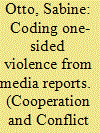

|
|
|
|
|
| Publication |
2013.
|
| Summary/Abstract |
Event datasets on political violence, which are comprised of coded collected news reports, have enjoyed a renaissance within the academic community. The inclusion of civilian fatalities within these datasets is a promising and welcomed advancement regarding the availability of data on one-sided violence. However, these datasets are often criticised due to their heavy reliance on media records, which may be tainted by biases. So far, little attention has been paid to the specific problems that arise in the coding procedure with respect to one-sided violence. This article addresses such difficulties by discussing particular challenges presented by media biases and by providing empirical evidence from coding one-sided violence. Furthermore, solutions and strategies are offered to the issues that could affect the coding process, including increased transparency, definition-adaptation, and the use of appropriate statistical models.
|
|
|
|
|
|
|
|
|
|
|
|
|
|
|
|
| 2 |
ID:
126797
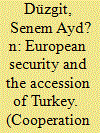

|
|
|
|
|
| Publication |
2013.
|
| Summary/Abstract |
Following a poststructuralist theorising of identity in international relations, which argues that identity is relationally and discursively constructed through foreign policy, this article attempts to analyse the way in which the European Commission discursively constructs European identit(ies) in its relations with Turkey around the theme of 'security'. The study utilises the methodological tools of critical discourse analysis in analysing the speeches and field interviews conducted with European Commission officials, in examining the way in which they construct 'Europe' in relation to the security implications of Turkish accession. The article's findings challenge the argument that Europe is moving beyond the modern state to resemble a postmodern order, and problematises the designation of the Commission as a 'cosmopolitan' actor in EU enlargement policy.
|
|
|
|
|
|
|
|
|
|
|
|
|
|
|
|
| 3 |
ID:
126795


|
|
|
|
|
| Publication |
2013.
|
| Summary/Abstract |
The increasing reliance on private security companies (PSCs) in and around international peace operations has created new public-private constellations, influencing both military and civilian efforts, sometimes generating problematic relationships and even violence between public and private actors, as well as unclear divisions of labour, authority and responsibility. To explain how and why these problems occur, mapping out the understandings that these different actors have of each other in different contexts is of key importance. Through an analysis of Swedish officers' views of private security actors, this paper aims to contribute to our understanding of the complex relationships between civilian authorities, state militaries and commercial security actors. Particularly, the article will shed new light on 'PSC-military' relations and the ways in which the private security sector functions as both a competitor and a career option for former or active service personnel. The article draws on a study commissioned by the Swedish Armed Forces and is empirically based on in-depth interviews and a survey of Swedish officers' attitudes to PSCs.
|
|
|
|
|
|
|
|
|
|
|
|
|
|
|
|
| 4 |
ID:
126798
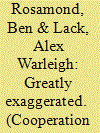

|
|
|
|
|
| Publication |
2013.
|
| Summary/Abstract |
In a recent piece in this journal Jørgensen and Valbjørn develop a typology of intellectual dialogue across fields that yields rather negative conclusions about the prospects for sustainable dialogue between 'European studies' and the 'new regionalism'. This response disputes this pessimistic conclusion. First, it is argued that while their derivation of models of dialogue is impressive, it is nonetheless incomplete. Using Jørgensen and Valbjørn's premises, the article derives a 'market' mode of dialogue that represents a challenge to their assumption that dialogue will tend towards hierarchy. Second, the article accepts that there are important 'sociology of knowledge' impediments to effective dialogue within political science and International Relations, but maintains that Jørgensen and Valbjørn fail to work through the question of 'dialogue between whom?' The article argues that methodological division is the most significant impediment to dialogue, but maintains that within-methodology dialogue is more than viable in the case under scrutiny in this debate. Third, having established these general parameters of disagreement, the article moves to a number of more particular criticisms of the assumptions made by Jørgensen and Valbjørn about extant calls for dialogue between scholars in these two fields.
|
|
|
|
|
|
|
|
|
|
|
|
|
|
|
|
| 5 |
ID:
126807
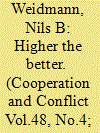

|
|
|
|
|
| Publication |
2013.
|
| Summary/Abstract |
The majority of conflict event datasets rely on media reports as their sole source of information. Because of the various difficulties associated with media reports, it is useful to compare conflict events based on them with those obtained from other observers. A paper published in 2010 by O'Loughlin and colleagues makes a first attempt to do this by using (1) a media-based event dataset and (2) military records on Afghanistan. While the authors conclude that the level of agreement between the two datasets is high, my results show that this goes away once we aggregate to finer analytical resolutions - those that are typically used in micro-level conflict analyses. Thus, rather than giving us the 'all-clear' for the accuracy and quality of media-based conflict data, my results once again point to the importance of robustness tests in quantitative conflict research, but also to the need to study the discrepancies in different reporting mechanisms to find out what they can and what they cannot tell us.
|
|
|
|
|
|
|
|
|
|
|
|
|
|
|
|
| 6 |
ID:
126796
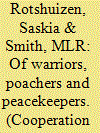

|
|
|
|
|
| Publication |
2013.
|
| Summary/Abstract |
Much research on conflict and the environment in Africa emphasises the competition for energy resources and valuable minerals as a cause of war. Drawing on current environmental research on conflict in sub-Saharan Africa, this study demonstrates how the lack of adequate wildlife protection generates new sources of instability, notably between poachers and park guards and between local populations and refugees displaced by war. The article offers both an analysis of the important role that wildlife protection can play in the peace-building process after war and an agenda for future research. Effective policies on wildlife can provide a framework for communication between formerly conflicting parties; they can educate the population on the importance of sustainable resource management; and they can promote financial stability. All of these elements are crucial in preventing a renewed cycle of violence.
|
|
|
|
|
|
|
|
|
|
|
|
|
|
|
|
| 7 |
ID:
126794


|
|
|
|
|
| Publication |
2013.
|
| Summary/Abstract |
Despite renewed interest in role theory and its promise to relate to agent-structure relationships, research in this area has underdeveloped notions of 'agency' and an incomplete understanding of the interaction between 'agency' and 'structure'. This problem can be attributed, in part, to the fact that the theory frequently overlooks the centrality of domestic political agents in the process of role conflict. An analysis of Danish decision-making over the country's involvement in Iraq and of Dutch decision-making over its involvement in Afghanistan illustrates the theoretical and empirical advantages of examining role conflicts with a focus on domestic politics. We conclude that studying role conflict as embedded in domestic political processes is important in the development of role theory in international relations research.
|
|
|
|
|
|
|
|
|
|
|
|
|
|
|
|
|
|
|
|
|